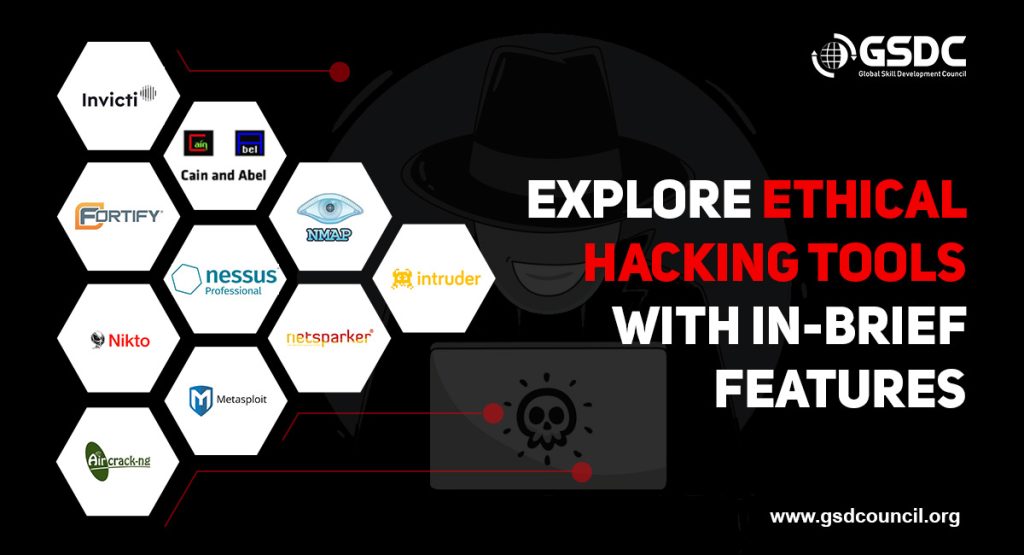Top Ethical Hacking Tools
Ethical hackers use specialized tools to detect vulnerabilities, test defenses, and simulate cyberattacks. Below are some of the most popular and effective tools for various hacking tasks, including network scanning, web testing, password cracking, and exploitation.
1. Network Scanning Tools
These tools help identify devices, open ports, and vulnerabilities in a network.
- Nmap (Network Mapper)
- Purpose: Scans networks and discovers open ports and services.
- Platform: Windows, macOS, Linux
- Usage: Detects live hosts, service versions, and operating systems.
- Nmap Website
- Angry IP Scanner
- Purpose: Lightweight tool for scanning IP addresses and ports.
- Usage: Quickly scans large networks and exports results.
2. Web Application Testing Tools
Used to identify security flaws in web applications.
- Burp Suite
- Purpose: A comprehensive platform for web security testing.
- Features: Proxy, scanner, and manual tools for web app exploitation.
- Usage: Detects vulnerabilities like SQL injection and XSS.
- Burp Suite
- OWASP ZAP (Zed Attack Proxy)
- Purpose: An open-source tool for finding web vulnerabilities.
- Usage: Scans for SQL injection, CSRF, and XSS attacks.
- OWASP ZAP
3. Password Cracking Tools
These tools test the strength of passwords by attempting to crack them using brute force, dictionary, or hybrid attacks.
- John the Ripper
- Purpose: A popular password cracker for various encryption formats.
- Usage: Cracks password hashes for systems like Linux and Windows.
- Hydra
- Purpose: Network login cracker supporting multiple protocols (SSH, FTP, HTTP, etc.).
- Usage: Brute-force attacks on passwords over the network.
4. Exploitation Tools
Used to exploit known vulnerabilities in software, services, or networks.
- Metasploit Framework
- Purpose: A powerful tool for developing and executing exploits.
- Usage: Tests vulnerabilities and simulates attacks to strengthen defenses.
- Metasploit
- BeEF (Browser Exploitation Framework)
- Purpose: Exploits browser vulnerabilities to gain access to systems.
- Usage: Tests how secure browsers are against phishing and other attacks.
- BeEF
5. Wireless Network Hacking Tools
These tools focus on Wi-Fi network vulnerabilities and encryption weaknesses.
- Aircrack-ng
- Purpose: Suite of tools to assess Wi-Fi security.
- Usage: Cracks WEP and WPA-PSK keys by capturing packets.
- Aircrack-ng
- Wireshark
- Purpose: A packet analyzer used for network troubleshooting and analysis.
- Usage: Captures and inspects data transmitted over networks in real-time.
- Wireshark
6. Social Engineering Tools
These tools simulate human-based attacks to test employee awareness and response.
- Social-Engineer Toolkit (SET)
- Purpose: Automates phishing and other social engineering attacks.
- Usage: Creates fake login pages and phishing emails for testing security awareness.
- SET
- Gophish
- Purpose: A phishing simulation toolkit.
- Usage: Designs phishing campaigns to test employee susceptibility.
7. OSINT Tools (Open Source Intelligence)
These tools collect publicly available information for reconnaissance.
- Shodan
- Purpose: A search engine for internet-connected devices.
- Usage: Identifies exposed services, IoT devices, and vulnerable servers.
- Shodan
- Maltego
- Purpose: Visualizes relationships between data points (domains, people, IPs).
- Usage: Used for social media analysis, network mapping, and reconnaissance.
- Maltego
8. Forensic and Monitoring Tools
These tools help analyze compromised systems and monitor for suspicious activities.
- Autopsy
- Purpose: A digital forensics tool used to analyze hard drives.
- Usage: Recovers deleted files and investigates disk contents.
- Autopsy
- Splunk
- Purpose: Monitors and analyzes machine-generated data for security events.
- Usage: Detects and alerts on suspicious network activities.
- Splunk
9. Reverse Engineering Tools
These tools decompile or debug software to find hidden vulnerabilities.
- Ghidra
- Purpose: A reverse engineering tool developed by the NSA.
- Usage: Decompiles code to identify malware and vulnerabilities.
- Ghidra
- OllyDbg
- Purpose: A debugger for analyzing binary programs.
- Usage: Useful for malware analysis and software cracking.
Conclusion
Ethical hacking tools are essential for identifying and mitigating vulnerabilities across networks, applications, and systems. Each tool has a specific role in the cybersecurity ecosystem, and mastering these tools allows ethical hackers to protect organizations from real-world threats.






